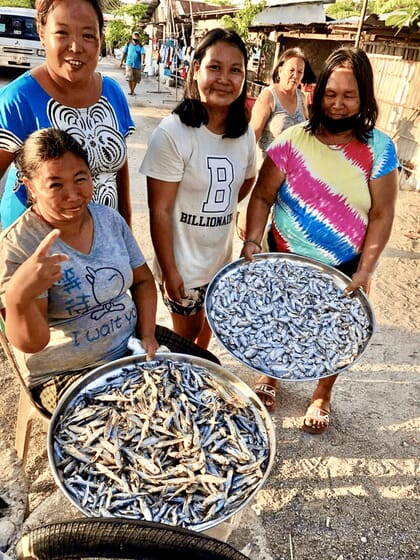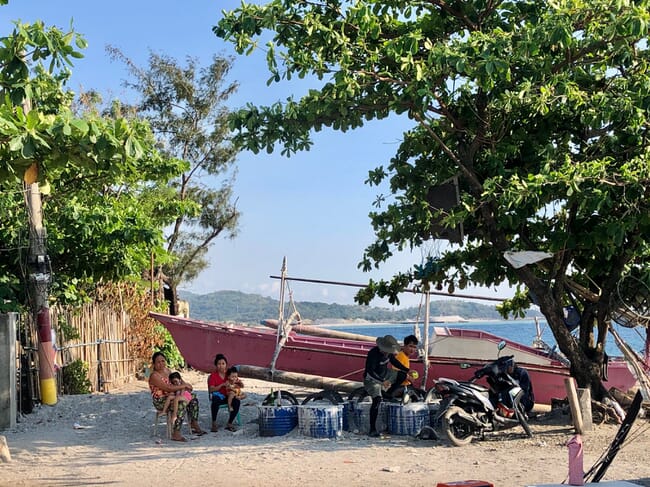
© Mayani
Established in 2019, Mayani has a grassroots network of over 144,000 organised small farmers and fisherfolk across seven regions of the Philippines.
JT Solis, co-founder and CEO, told The Fish Site: "While fish farming / aquaculture already contributes 2.3 million metric tons, or 54 percent of the total fisheries production in 2022 (Philippine Statistical Authority), it is still riddled with a lot of challenges including capped yield potential, limited access to affordable and quality feeds, and climate change vulnerability."
The Philippine’s current financial climate
Within the Philippines, the farming sector is considered to be a crucial economic backbone, with almost 60 percent of the nation’s poor employed in the sector’s agriculture, forestry, fishing, and aquaculture industries according to the World Bank in 2023.
Despite it being the primary economic activity in rural Philippines, the Banko Sentral ng Pilipinas (BSP) cited in 2018 that the credit gap for the sector sits at over 360 billion pesos ($6.3 billion), highlighting fundamental binding constraints that hamper adequate financing to fuel the sector’s peak potential.
Given this prevailing reality, Philippines-based finance super app GCash – operated by the country’s first “duocorn” Mynt – has entered agrifintech through a strategic bid with Mayani, to tackle the nation’s elusive phenomenon of rural financial inclusion.
Motivation for partnership
The two tech players teamed-up with a joint mandate to create the Philippines’ largest agri-credit movement to bank the rural unbanked. GCash and agri-technology firm Mayani will leverage the latter’s supply chain data to underwrite and jointly facilitate loans for organised farmers and fisherfolks needing a production lifeline to provide them quality inputs from Mayani, boost their yield, and enhance their capability to meet market demand while building their credit track record.

© Mayani
How Mayani will unlock value for aquaculture farmers
Mayani plans to integrate its end-to-end proprietary tech stack with GCash to index on their lending balance sheet, quantum reach, and loan approval to e-wallet disbursement infrastructure.
“Given this reality, Mayani intends to unlock the trapped value in the Philippine’s aquaculture sector by providing rural, small-scale fishers not just a stable market offtake for their harvest (i.e. milkfish, tilapia, and prawns, among others), but also a pathway for them to leverage credit towards boosting their yield and incomes, broaden access to quality feeds, and incentivise climate-smart production practices, including the adoption of Responsible Seafood Sourcing (RSS) standards,” added JT Solis.
Such production credit will be offered against concrete purchase orders from Mayani linked to its downstream commercial portfolio, along with the profit by small farmers and fishers of its agricultural inputs, like seeds and feeds to mitigate credit risk. Since 2016, Fuse has disbursed over 100 billion pesos ($1.7 billion) in loans and has supported millions of Filipinos in achieving their financial aspirations and goals.
JT Solis also stated: "We will pilot within the Calabarzon region, which is home to a lot of tilapia hatcheries and milkfish farmers whose livelihoods contribute to significant poverty reduction for their communities along Laguna de Bay and Taal Lake. Afterwards, we will rapidly scale across the adjacent regions in Luzon before heading to the entire archipelago."
In the middle of last year, Mayani closed a $1.7 million seed funding led by agrifoodtech venture capital firm AgFunder, along with other key backers Atlas Ventures, Plug and Play Ventures, Accelerating Asia, and Ocean Impact Organisation.
Meanwhile, Mynt is backed by telco giant Globe, Alibaba’s Ant Group, Philippine conglomerate Ayala Corporation, and global private equity funds like Bow Wave Capital. In 2021, Mynt raised more than $300 million led by global growth investor Warburg Pincus and New York-based private equity firm Insight Partners, which made them the Philippines’ first “double unicorn” valued at over $2 billion. Its e-wallet GCash has over 80 million active users in the country.




